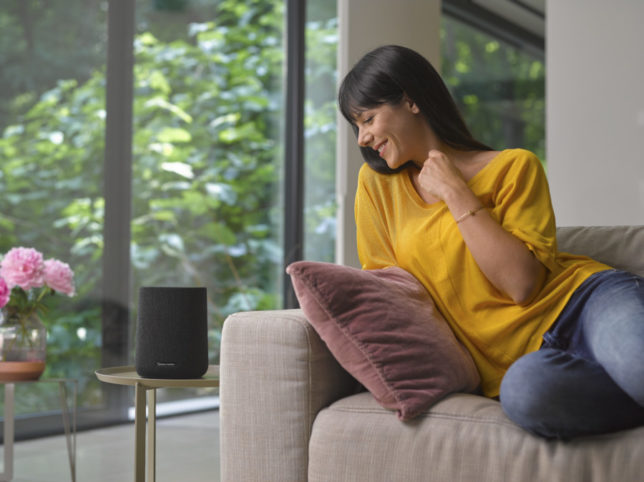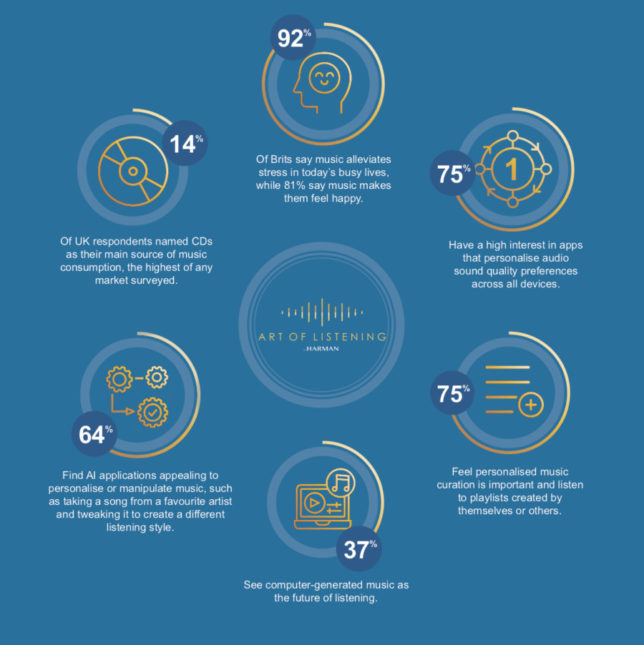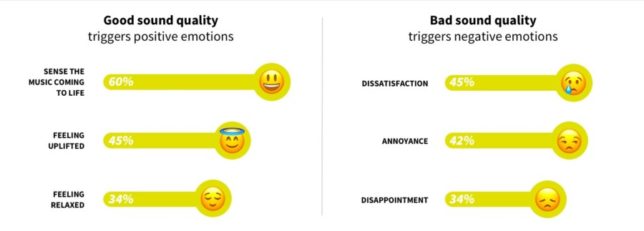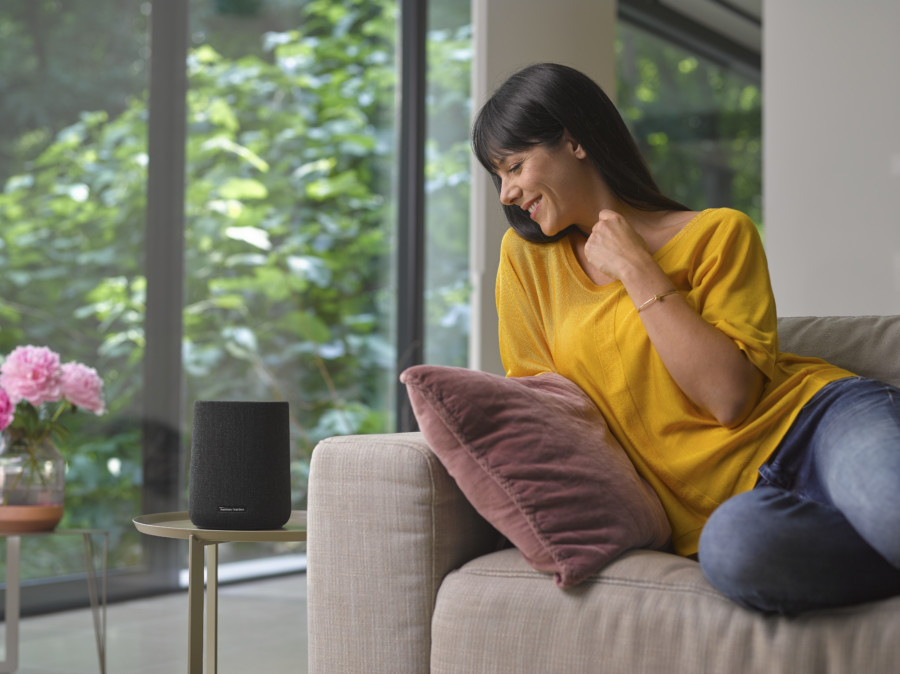Numerous scientific studies have shown that music can benefit us physiologically, psychologically, and cognitively. Amid the coronavirus pandemic we are turning to music more than ever, but are we getting its full benefits? Audio expert Dr Sean Olive explains that when used consciously and paired with ‘active listening’, music can be used as a tool to help manage our emotions and improve our wellbeing. Here are his tips to improve your listening technique and gain music’s full benefits.

Studies since the spread of coronavirus have shown that 58 per cent of people are listening to music while in lockdown. And it has never been a better time to indulge in music. Working with a research company, my team and I found that 92 per cent of Brits believe music eases everyday pressures, while 81 per cent say music makes them feel happy.
Music stimulates the emotions and contributes to a sense of happiness and wellbeing. It can modify our mood, reduce stress and anxiety, improve our productivity and sleep, and it can also enhance our memory. When listening to music we produce neurochemicals in our brain including dopamine, which is associated with pleasure and rewards, much like food, sex and drugs, but less addictive and without the negative side effects. Our biorhythms, heart rate, blood pressure and breathing tend to synchronise with the beat of the music. Slower, softer, calm music tends to relax us whereas faster-paced sounds arouse energy.
However, our typical habit of passively listening to music in the background means we aren’t getting most of the health and wellbeing benefits. So how do we achieve this? ‘Active listening’ is a key technique that can help you reach this deeper state of listening that will immerse you in the music and possibly make today’s difficulties disappear.

Attention please
The first step in active listening is to give music your full attention. This may seem obvious, but most people listen to music in the background. It’s on while you’re working, cooking or cleaning – it has become background noise. We need to bring it back to the fore. Imagine you’re at a performance: distracting devices are turned off, the lights go down, the audience is hushed and the music begins. At home, turn off the TV and phones, turn the music volume to a moderate level – 75-80 dBA for the technical minded – not so loud to cause hearing fatigue or disturb neighbours, but not too soft to obscure details in the music. Then, sit back, relax, close your eyes and really listen.
Don’t snack on music
Today, we’ve got into a terrible habit of ‘snacking’ on music. We select and play individual tracks or put them in a compilation, quickly identifying those that we don’t enjoy and skipping them, which can cause us to be restless. Listening to full albums or complete musical works is really important to get the most physical and emotional health benefits from music. Listening to the full musical structure, aesthetic and emotional ‘storyline’ the artist has created will be more fulfilling than an algorithmically-determined mishmash of tunes.
Audio quality
The quality of the recording and playback equipment impact greatly in delivering the correct timbre, dynamics and spatial richness of the performance. Our studies show that good sound quality triggers positive emotions, such as a sense of the music coming to life (60 per cent), feeling uplifted (49 per cent) or feeling relaxed (38 per cent), while bad sound quality activates negative emotions such as dissatisfaction (45 per cent), annoyance (42 per cent), or disappointment (34 per cent).
Setting up your speakers to ensure they have good interaction with the room acoustics is important and affects the quality and quantity of bass, but for those who lack space and budget, good headphones that fit around the ears are an excellent alternative.

Select your emotion
The emotional effect you get from the listening experience comes from the choice of music itself. The tempo, melody, rhythm, dynamics, spectral characteristics, and musical complexity, amongst others, will produce an emotion. Of course, a piece of music that makes one person energised may sound like noise to you – it varies depending on the individual listener, their preferences and familiarity with the music. Typically, music and data scientists can predict the emotional impact on listeners by analysing and modelling those acoustic features.
Often, when you feel down or sad, you pick music that reflects your mood. However, by consciously selecting and actively listening – really listening – to music that reflects how you want to feel, you can help that emotion rub off on you. It can feel counterintuitive, but it can have a huge impact and help reconnect you with a positive frame of mind.

Clap for the NHS
Music creates unity. Instead of concerts, communities in lockdown across Italy, Spain and New York have had music block parties from their balconies. In Marin County, California, residents go outside and howl like coyotes every evening to show support for medical workers. In the UK, every week on Thursday at 8pm people take to their front doorsteps and clap for the National Health Service (NHS) and carers saving lives. It may only seem like noise, but the expression of unity and love in creating an auditory experience together is uplifting and healing. If your only opportunity to connect with music is at this time, get out there and bang your saucepan!
Combined, these techniques can help you to achieve a deeper state of listening. You’ll know you’ve got there when your toes are tapping and you are losing yourself in the melody, singing along and feeling those music-induced chills down your back. Most importantly, you’ll forget what’s going on around you and be completely immersed. To find out more about active listening, tune into the first episode of the ‘Audio Matters’ podcast, which is available on Podigee, Apple Podcasts, Spotify, and Deezer.
Music to get you through coronavirus
Here are my music suggestions to get you through these difficult times. The playlist includes tracks that use tempo and dynamics to create a positive and uplifting feel, while others are more soothing to create calm and relieve stress.
- The Four Seasons – Vivaldi
- I Hear Music – Ella Fitzgerald & Oscar Peterson
- Shine on Your Shoes – Mel Tormé
- Hey Ya! – OutKast
- Happy (from Despicable Me 2) – Pharrell Williams
- September – Earth, Wind & Fire
- Sexual Healing – Marvin Gaye
- The Planets, Op. 32 – 4. Jupiter, the Bringer of Jollity – Orchestre Symphonique de Montréal
About the expert
 Dr Sean Olive is senior fellow of acoustic research for HARMAN – the name behind audio equipment brands Harman Kardon, JBL and AKG. Dr Olive is an expert in scientific research related to perception and measurement of sound quality in audio systems such as microphones, loudspeakers, headphones, amplifiers and automotive audio systems, and is responsible for conducting research to ensure the outstanding sound quality of HARMAN’s consumer, professional, and automotive products. Dr Olive has authored/co-authored over 50 research papers and three book chapters for which he received several awards including the AES Fellowship. Sean is a regular invited speaker and chair for international scientific conferences, industry events, and universities, and he serves as an expert audio spokesperson for internal and external customers.
Dr Sean Olive is senior fellow of acoustic research for HARMAN – the name behind audio equipment brands Harman Kardon, JBL and AKG. Dr Olive is an expert in scientific research related to perception and measurement of sound quality in audio systems such as microphones, loudspeakers, headphones, amplifiers and automotive audio systems, and is responsible for conducting research to ensure the outstanding sound quality of HARMAN’s consumer, professional, and automotive products. Dr Olive has authored/co-authored over 50 research papers and three book chapters for which he received several awards including the AES Fellowship. Sean is a regular invited speaker and chair for international scientific conferences, industry events, and universities, and he serves as an expert audio spokesperson for internal and external customers.

